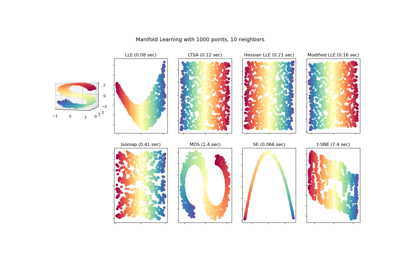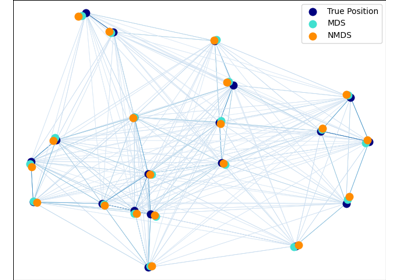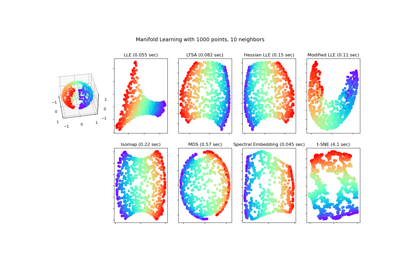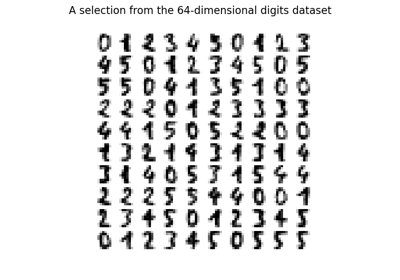sklearn.manifold.MDS¶
- class sklearn.manifold.MDS(n_components=2, *, metric=True, n_init=4, max_iter=300, verbose=0, eps=0.001, n_jobs=None, random_state=None, dissimilarity='euclidean')[source]¶
Multidimensional scaling.
Read more in the User Guide.
- Parameters
- n_componentsint, default=2
Number of dimensions in which to immerse the dissimilarities.
- metricbool, default=True
If
True, perform metric MDS; otherwise, perform nonmetric MDS.- n_initint, default=4
Number of times the SMACOF algorithm will be run with different initializations. The final results will be the best output of the runs, determined by the run with the smallest final stress.
- max_iterint, default=300
Maximum number of iterations of the SMACOF algorithm for a single run.
- verboseint, default=0
Level of verbosity.
- epsfloat, default=1e-3
Relative tolerance with respect to stress at which to declare convergence.
- n_jobsint, default=None
The number of jobs to use for the computation. If multiple initializations are used (
n_init), each run of the algorithm is computed in parallel.Nonemeans 1 unless in ajoblib.parallel_backendcontext.-1means using all processors. See Glossary for more details.- random_stateint, RandomState instance or None, default=None
Determines the random number generator used to initialize the centers. Pass an int for reproducible results across multiple function calls. See Glossary.
- dissimilarity{‘euclidean’, ‘precomputed’}, default=’euclidean’
Dissimilarity measure to use:
- ‘euclidean’:
Pairwise Euclidean distances between points in the dataset.
- ‘precomputed’:
Pre-computed dissimilarities are passed directly to
fitandfit_transform.
- Attributes
- embedding_ndarray of shape (n_samples, n_components)
Stores the position of the dataset in the embedding space.
- stress_float
The final value of the stress (sum of squared distance of the disparities and the distances for all constrained points).
- dissimilarity_matrix_ndarray of shape (n_samples, n_samples)
Pairwise dissimilarities between the points. Symmetric matrix that:
either uses a custom dissimilarity matrix by setting
dissimilarityto ‘precomputed’;or constructs a dissimilarity matrix from data using Euclidean distances.
- n_features_in_int
Number of features seen during fit.
New in version 0.24.
- feature_names_in_ndarray of shape (
n_features_in_,) Names of features seen during fit. Defined only when
Xhas feature names that are all strings.New in version 1.0.
- n_iter_int
The number of iterations corresponding to the best stress.
See also
sklearn.decomposition.PCAPrincipal component analysis that is a linear dimensionality reduction method.
sklearn.decomposition.KernelPCANon-linear dimensionality reduction using kernels and PCA.
TSNET-distributed Stochastic Neighbor Embedding.
IsomapManifold learning based on Isometric Mapping.
LocallyLinearEmbeddingManifold learning using Locally Linear Embedding.
SpectralEmbeddingSpectral embedding for non-linear dimensionality.
References
“Modern Multidimensional Scaling - Theory and Applications” Borg, I.; Groenen P. Springer Series in Statistics (1997)
“Nonmetric multidimensional scaling: a numerical method” Kruskal, J. Psychometrika, 29 (1964)
“Multidimensional scaling by optimizing goodness of fit to a nonmetric hypothesis” Kruskal, J. Psychometrika, 29, (1964)
Examples
>>> from sklearn.datasets import load_digits >>> from sklearn.manifold import MDS >>> X, _ = load_digits(return_X_y=True) >>> X.shape (1797, 64) >>> embedding = MDS(n_components=2) >>> X_transformed = embedding.fit_transform(X[:100]) >>> X_transformed.shape (100, 2)
Methods
fit(X[, y, init])Compute the position of the points in the embedding space.
fit_transform(X[, y, init])Fit the data from
X, and returns the embedded coordinates.get_params([deep])Get parameters for this estimator.
set_params(**params)Set the parameters of this estimator.
- fit(X, y=None, init=None)[source]¶
Compute the position of the points in the embedding space.
- Parameters
- Xarray-like of shape (n_samples, n_features) or (n_samples, n_samples)
Input data. If
dissimilarity=='precomputed', the input should be the dissimilarity matrix.- yIgnored
Not used, present for API consistency by convention.
- initndarray of shape (n_samples,), default=None
Starting configuration of the embedding to initialize the SMACOF algorithm. By default, the algorithm is initialized with a randomly chosen array.
- Returns
- selfobject
Fitted estimator.
- fit_transform(X, y=None, init=None)[source]¶
Fit the data from
X, and returns the embedded coordinates.- Parameters
- Xarray-like of shape (n_samples, n_features) or (n_samples, n_samples)
Input data. If
dissimilarity=='precomputed', the input should be the dissimilarity matrix.- yIgnored
Not used, present for API consistency by convention.
- initndarray of shape (n_samples,), default=None
Starting configuration of the embedding to initialize the SMACOF algorithm. By default, the algorithm is initialized with a randomly chosen array.
- Returns
- X_newndarray of shape (n_samples, n_components)
X transformed in the new space.
- get_params(deep=True)[source]¶
Get parameters for this estimator.
- Parameters
- deepbool, default=True
If True, will return the parameters for this estimator and contained subobjects that are estimators.
- Returns
- paramsdict
Parameter names mapped to their values.
- set_params(**params)[source]¶
Set the parameters of this estimator.
The method works on simple estimators as well as on nested objects (such as
Pipeline). The latter have parameters of the form<component>__<parameter>so that it’s possible to update each component of a nested object.- Parameters
- **paramsdict
Estimator parameters.
- Returns
- selfestimator instance
Estimator instance.




